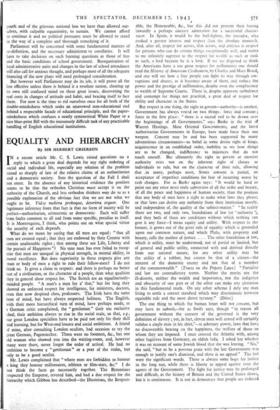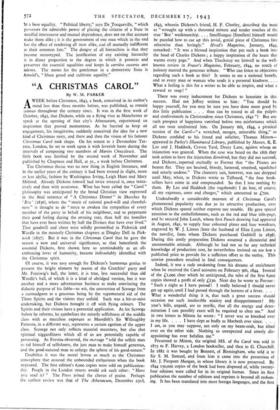EQUALITY AND HIERARCHY
• By SIR HERBERT GRIERSON
TN a recent article Mr. C. S. Lewis raised questions on a What do we mean by saying that all men are equal: "that all men are created equal ; that they are endowed by their Creator with certain unalienable rights ; that among these are Life, Liberty and the pursuit of Happiness "? No sane man has ever failed to recog- nise that men are unequal in physical strength, in mental ability, in moral excellence. But does superiority in these respects give any man or body of men a right to rule their fellow-men? I do not think so. It gives a claim to respect: and there is perhaps no better test of a civilisation, or the character of a people, than what qualities they in general show respect for. The Scotch are an equalitarianly- minded people. "A man's a man for a' that," but for long they showed an unforced respect for intelligence, for ministers, doctors, even that now despised class, professors. The Irish have the same bent of mind, but have always respected holiness. The English, with their more hierarchical turn of mind, have perhaps made, as a German critic complained, the "gentleman" their too exclusive ideal, their ambition always to rise in the social scale, so that, e.g., our great London specialists have to be paid not only for their skill and learning; but for West-end houses and social ambitions. A friend of mine, after consulting London oculists, had occasion to try the great German, Pagenstecher. There were no footmen, &c., but one old woman who showed you into the waiting-room, and, however many were there, never forgot the order of arrival. He had no ambition to become a "gentleman" or a peer of the realm, but only to be a good oculist.
Mr. Lewis complained that "where men are forbidden to honour a king they honour millionaires,, athletes or film-stars, &c-" I do not think the facts go necessarily together. The Byzantines respected the Emperor, revered him, and had a due respect for the hierarchy which Gibbon has described—the Illustrious, the Respect- able, the Honourable, &c., but this did not prevent their having inwardly a perhaps sincerer admiration for a successful chariot-. racer. In Spain, it would be the bull-fighter, the toreador, who evoked a greater interest and respect than the absolute monarch. And, after all, respect for actors, film actors, and athletes is respect for persons who can do certain things exceptionally well, and seems to me infinitely superior to the respect for wealth as such or rank as such, a lord because he is a lord. If we are disposed to think the Americans have a too great respect for millionaires one should read the History of American Civilisation, by Charles and Mary Beard,
• and one will see how a free people can fight its way through cor- ruptions and abuses, as it becomes aware of them, and reduce the power and the prestige of millionaires, despite even the complacency to wealth of Supreme Courts. There is, despite apparent turbulence and contempt for things not practical, a great deal of respect for ability and character in the States.
But respect is one thing, the right to govern—authority—is another. Government has always rested on two things : force and consent ; force in the first place : " there is a sacred veil to be drawn over the beginnings of all Governments." say, Burke in the trial of Warren Hastings. Most Oriental Governments, and the latest authoritarian Governments in Europe, have made force their one weapon. Consent may be and has been supported by many adventitious circumstances—as belief in some divine right of kings, acquiescence in an established order, inability to see how things are to be changed, indifference to injustices that do not touch oneself. But ultimately the right to govern or exercise authority rests not on the inherent right of classes or individuals to rule, but on the character of their rule, allowing that .in many, perhaps most, States consent is partial, an acceptance of imperfect conditions for fear of incurring worse by rash changes. For as Burke again says : "It would be hard to point out any error more truly subversive of all the order and beauty, of all the peace and happiness of human society, than the position that any body of men have a right to make what laws they please, or that laws can derive any authority from their institution merely, and independent of, the quality of the subject-matter." "In reality there are two, and only two, foundations of law (or authority '), and they both of them are conditions without which nothing can give it any force—I mean equity and utility. With respect to the former, it grows out of the great rule of equality which is grounded upon our common nature, and which Philo, with propriety and beauty, calls the mother of justice. . . . The offitr foundation of law, which is utility, must be understood, not of partial or limited, but of general and public utility, connected with and derived directly from our rational nature, for any other utility may be the utility of a robber, but cannot be that of a citizen—the interest of the domestic enemy and not that of a member of the commonwealth." (Tracts on the Popery Laws.) "Partiality and law are contradictory. terms. Neither the merits nor the ill-deserts, neither the wealth and importance, nor the indigence and obscurity of one part or of the other can make any alteration in this fundamental truth. On any other scheme I defy any man living to settle a correct standard which may discriminate between equitable rule and the most direct tyranny." (Ditto.) The one thing to which the human heart will not consent, but may have to submit,—for as Swift says, though "in reason all government without the consent of the governed is the very definition of slavery ; yet, in fact, eleven men well armed will certainly subdue a single man in his shirt,"—is arbitrary power, laws that have no discoverable bearing on the happiness, the welfare of those on whom they are imposed. I once crossed the Atlantic with, among other fugitives from Germany, an oldish lady. I asked her whether it was on account of some Jewish blood that she was leaving. "No," she said, "but to be a persona grata with the last Government was enough to justify one's dismissal, and there is no Appeal." The last were the significant words. There is always some hope for justice in the long run, while there is liberty to appeal against even the agents of the Government. The fight for justice may be prolonged and difficult, as the history of Britain and the United States shows, but it is continuous. It is not in democracy that people are reduced
to a base equality. "Political liberty," says De Tocqueville, "which possesses the admirable power of placing the citizens of a State in needful intercourse and mutual dependence, does not on that account make them alike ; it is the government of one man which in the end has the effect of .rendering all men alike, and all mutually indifferent Lo their common fate." The danger of all hierarchies is that they become stereotyped. The justification of any existing hierarchy is in direct proportion to the degree in which it protects and preserves the essential equalities and keeps la carriere ouverte aux talents. The motto for the gentleman in a democratic State is Arnold's, "Shun greed and cultivate equality."



























 Previous page
Previous page